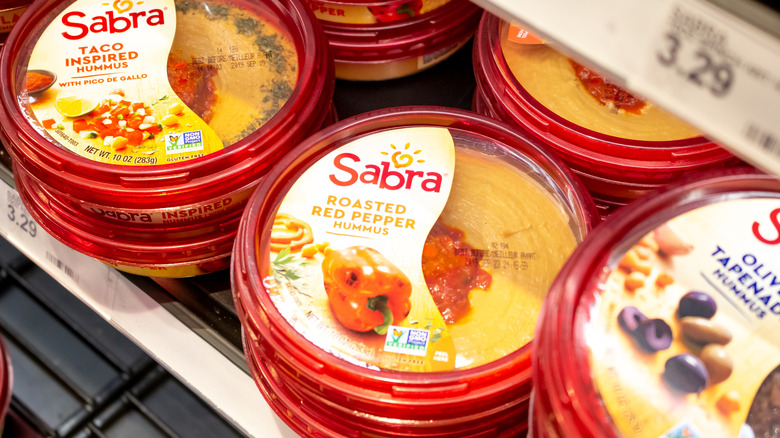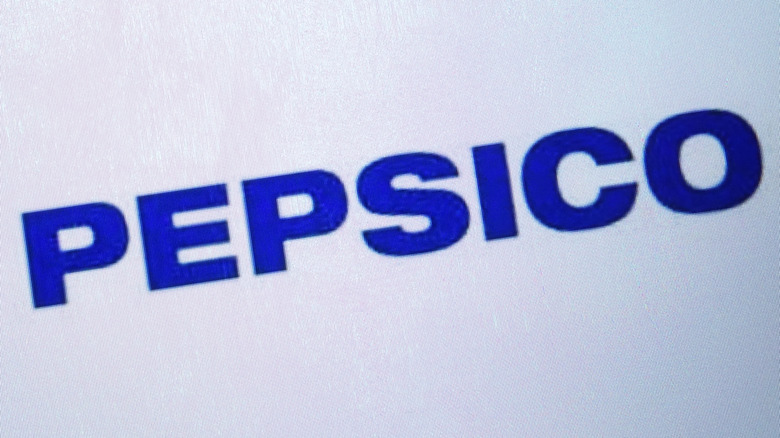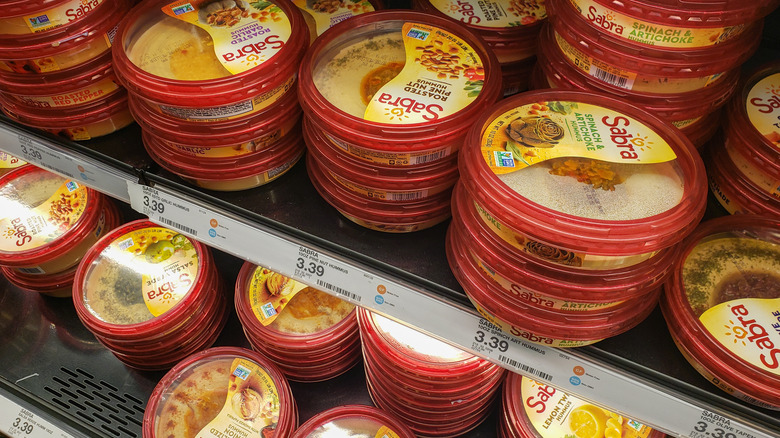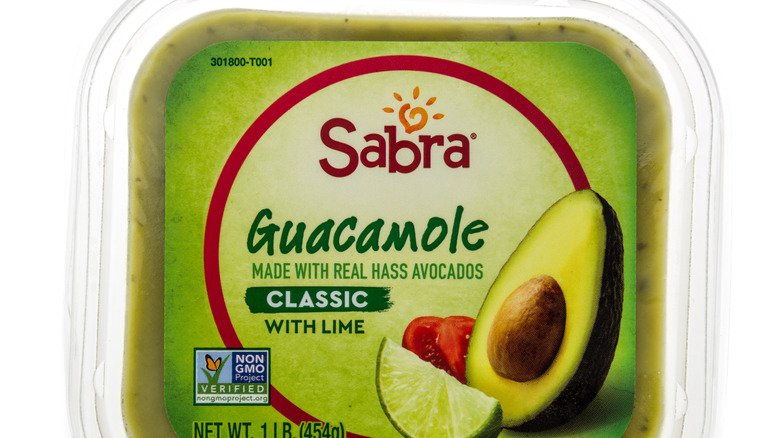The Untold Truth Of Sabra
Chances are if you've walked down the refrigerated aisle of pre-made dips at your local grocery store, you can easily spot different hummus brands. Sabra may not only be ubiquitous, but easy to spot with their catchy red-lined lids with transparent tops. Hummus is a common Middle Eastern spread made with cooked chickpeas, tahini (also known as sesame paste), lemon juice, garlic and spices. The ingredients may be simple, but each country as well as region has their special way to make this silky and creamy dip.
Hummus may now be readily available at the majority of supermarkets, often with several brands available as well as flavors to choose from. But when Sabra launched, hummus wasn't on the radar for most Americans; in fact, it wasn't at all well-known. This Israeli-created company has helped bring hummus to the forefront in the United States as a commonplace go-to dip to bring to a party or gathering, to smear on sandwiches or wraps, or to eat with vegetables, crackers or chips.
Began in the 1980s
Sabra began in 1986, when Zohar Norman partnered with the Yanko family with the goal of bringing delicious Mediterranean foods to the masses in the United States. The Yanko family already owned a company known as Tzabar, which specialized in pre-made salads and dips, according to Strauss Group. Within seven years, a new partner, Yehuda Pearl, entered the picture to expand the brand throughout North America.
As the company has grown and evolved, its products have become easier to find, in big chain supermarkets as well as small mom and pop grocers. That's in part to being co-owned by the Strauss Brand Group in 2005, a company based in Israel, giving the company 21% ownership. By 2008, PepsiCo decided to dive into the dips business by becoming 50% owners with Strauss Group and participating in the development, creation, and marketing aspects of the business, according to the Strauss Group website.
They have more than a dozen types of hummus
Despite requiring a short and simple list of ingredients to make hummus, you may be surprised just how creative and expansive recipes can become when you play with flavor combinations. Dedicated to this delicious chickpea-based dip, you can find an array of varieties whether you're feeling adventurous or want to take the traditional recipe to the next level. Sabra offers classic hummus with the standard ingredients of chickpeas, tahini, lemon juice, garlic and seasonings as well as elaborate on the theme to create a line-up of over 15 hummus dips.
If you're undecided on what to choose, you can pick up a few different varieties, including salsa verde hummus, caramelized onion hummus, and everything bagel seasoned hummus (via Sabra). They've got you covered. And if you love spinach and artichoke dip but also want hummus, consider tasting their version of fusing these two delicious dips together to make spinach and artichoke dip hummus.
Hummus might be their claim to fame, but they also make another dip
Although Sabra may be known for their extensive list of hummus flavors, this company isn't only dedicated to making hummus to enjoy at a party, or to dip with tortilla or pita chips. Sabra also specializes in another popular dip that you'll often find at a party or gathering as one of the many snack foods: guacamole.
A chunky dip made from avocados and mixed with lime, some tomatoes, and onion, guacamole is a dip that pleases most palettes. And it can accompany tacos, burritos, quesadillas, or other dishes — you really can't go wrong. Making guacamole is easy to do at home, as long as you have ripe avocados, but there are times when it may be easier to just pick up guacamole that's already made.
The recipe may be simple, but Sabra has four different versions of this delicious chartreuse-colored dip to cater to different needs and preferences, from spicy guacamole to Mexican Street Corn Inspired Guacamole, according to their website. So whatever you're in the mood for, whether it's a spicy dip made with avocados or a legume, Sabra has you covered.
American versions of hummus may be not be the real thing
Sabra may be a dominant player in the hummus market — it's continually expanding. However, not all hummus brands are happy about that, in part because it can be a lot harder to compete with a giant corporation who has more marketing dollars and presence.
Wajdi Wadi is the founder of the family-owned brand Holy Land, and believes that a smaller brand is likely to make better hummus. That makes sense, considering when you make something on a smaller scale you can have more control at every step of the process. He told "Today," "Our biggest struggle here in America is dealing with a consumer who does not know how hummus should taste. They buy Sabra or Tribe not because it's the best hummus but because it's what they know." So if your first initiation to hummus is one of the big name brands, he's suggesting that you likely haven't tasted the real essence of the dip. A lot of it is also a cultural issue, since hummus is a staple in Middle Eastern cuisine but it's been adapted to capitalize on American palates.
There were major hummus recalls in 2015 and 2021
There can be downsides to becoming a big company producing tons of hummus to meet demand and sell across the United States. Every now and again, big factories can have problems with quality control as well as cross contamination. In April 2015, Sabra voluntarily recalled 30,000 cases of hummus due to a possible listeria contamination. According to CNN, listeria was detected in a batch during a routine check in a random sample taken at a locale in Michigan. As the U.S. Food and Drug Administration (FDA) tells us, "Listeria monocytogenes can cause serious and sometimes fatal infections in young children, frail or elderly people, and others with weakened immune systems."
More recently, in March 2021, Sabra recalled around 2,100 cases of their Classic Hummus after a routine check by the FDA showed a "possible salmonella contamination" (via USA Today). Customers were encouraged to bring the hummus back to the place of purchase for a refund.





